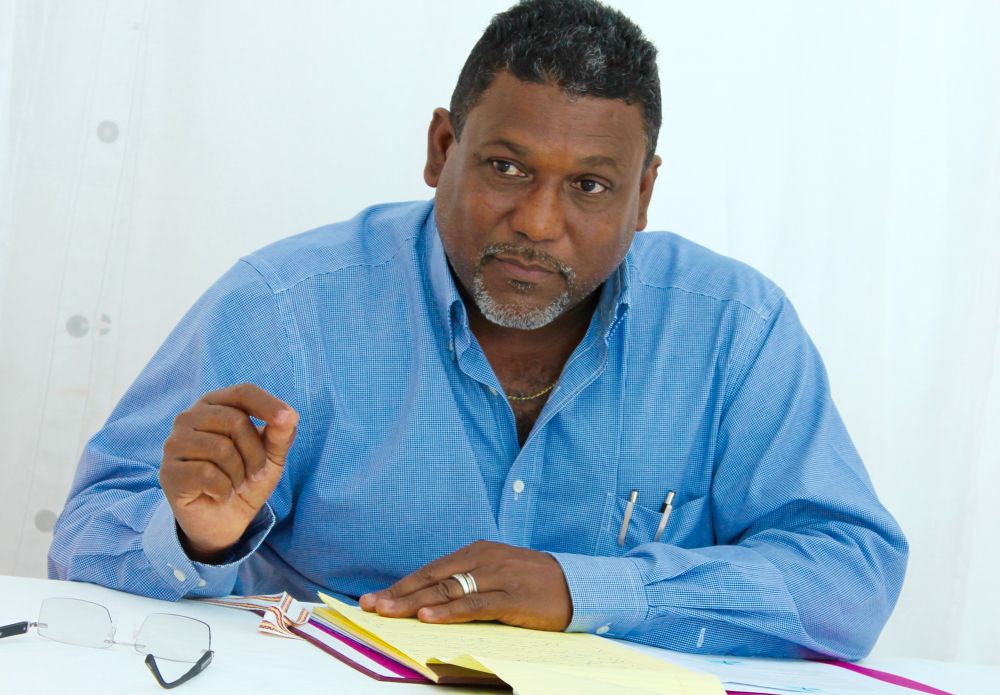Alain Richardson hopes the Constitutional Council will rule in favor of the Collectivité
"I'm here as a former president of the Collectivité, and not as a politician in full preparation for future deadlines" said Alain Richardson as a preamble to his news conference on Wednesday morning. He was speaking on the subject of the QPC recently submitted by the Collectivité and on the compensation for transfer of charge.
The QPC, is a way for a community or an individual to challenge a decision which would not, in their view, be consistent with the Constitution. The Saint-Martin Collectivité has always criticized the amount of the grant awarded by the Government during Saint-Martin’s change of status so that the Collectivité would ensure the Government’s authority (grants previously awarded to the regional and general counsels of Guadeloupe and St. Martin as township). As this battle did not bear any results, the Collectivité decided to submit a QPC. It was submitted to the Paris Administrative Court handling the case, which submitted it to the Conseil d’Etat, which was to validate the procedure and therefore forwarding it to the Conseil constitutionnel, the Authority that shall decide whether the Collectivité is right or wrong.
"A CLEAR DESIRE TO HAVE THE COLLECTIVITE FAIL"
"I am happy to see that the Administrative Court agrees to forward the QPC and more pleasantly surprised that the Conseil d’Etat agrees to submit it to the Conseil constitutionnel" said Alain Richardson who says he "trusts" the latter. If this council rules in favor of the Collectivité, it will become a "founding jurisprudence, St. Martin will be an example" for all the Collectivités in France, he confirms. Indeed, it will prove that the amount of fees paid by the Government to the Collectivité for them to ensure the Government’s authority in their own territory is not good. That is a disadvantage to Saint-Martin. And Alain Richardson assumes that Saint-Martin is not alone in this situation.
According to the former president, "there is a clear desire to have the Collectivité of St. Martin fail in their new status" in order to discourage other communities (overseas) from seeking the same autonomy, "from following the same path." The Government does not want to see its fields of authority reduced he says. He even adventures to say that "the administration has the power." Not the political officials.
Alain Richardson has had this vision for a long. "When I was mere territorial councilor in 2010, I was already saying that we should not be content with the simple procedure of litigation but needed to use the QPC" he recalls. As soon as he was elected president in 2012, he worked on the subject. "I was asked to conduct legal consultations to identify ways and measures to ensure that a QPC would be launched" explains Alain Richardson who is glad that current elected officials have taken over “his work".
His argument is simple: the Government did not respect the Constitution when calculating the amount of the famous grant because all the revenues that Saint-Martin perceived as a township, ceased to be paid. Alain Richardson evaluates the loss at 20%. Or 12 million euros of revenue that Saint Martin collected with respect to Dock Dues.
Questioned on the legitimacy of the fact that the Collectivité receives part of revenues they do not contribute to (Dock Dues are a tax on imported products to Guadeloupe and collected by the Region which distributes the proceeds among the different townships, yet products imported to St. Martin are not subject to Dock Dues), Alain Richardson defends himself by stating the difference between "the source and principle of revenues."
According to the law, "When Saint-Martin change(d) status, the Government (should have) grant(ed) them all the revenues they perceive as a township, all the revenues they used to collect to date, regardless of the mode of financing for these revenues. However, as a township, there was an item, the Dock Dues, which was not taken into account when calculating the grant” explains Alain Richardson, from which "Saint-Martin was excluded.”
A QPC TO CRITICIZE SAINT MARTIN’S EVICTION FROM THE CICE
Moreover, the former president considers that the Collectivité should submit a second QPC, in connection with the non-integration of St. Martin within the scope of the CICE, this tax credit granted by the Government to businesses so that they can improve their competitiveness. St. Martin businesses do not have access to this national system as it is financed by tax revenue, yet St. Martin has their own tax system, therefore it falls on them to set up and fund their own processes for their own businesses.
As for Alain Richardson, he appreciates the situation from a different point of view. "The CICE was implemented to offset the cost of labor. The Government has chosen to fund a tax measure but not the budget, which makes a difference and justifies our inaccessibility. However, our businesses are equally concerned by labor costs as Guadeloupe or metropolitan companies. The cost of labor is a responsibility of the Government, not of the Collectivité of St. Martin. Our companies should have access to this process; they find themselves aggrieved by being excluded "he argues.
According to Alain Richardson, it seems clear that there is "a willingness to stop the development of the Collectivité ".









